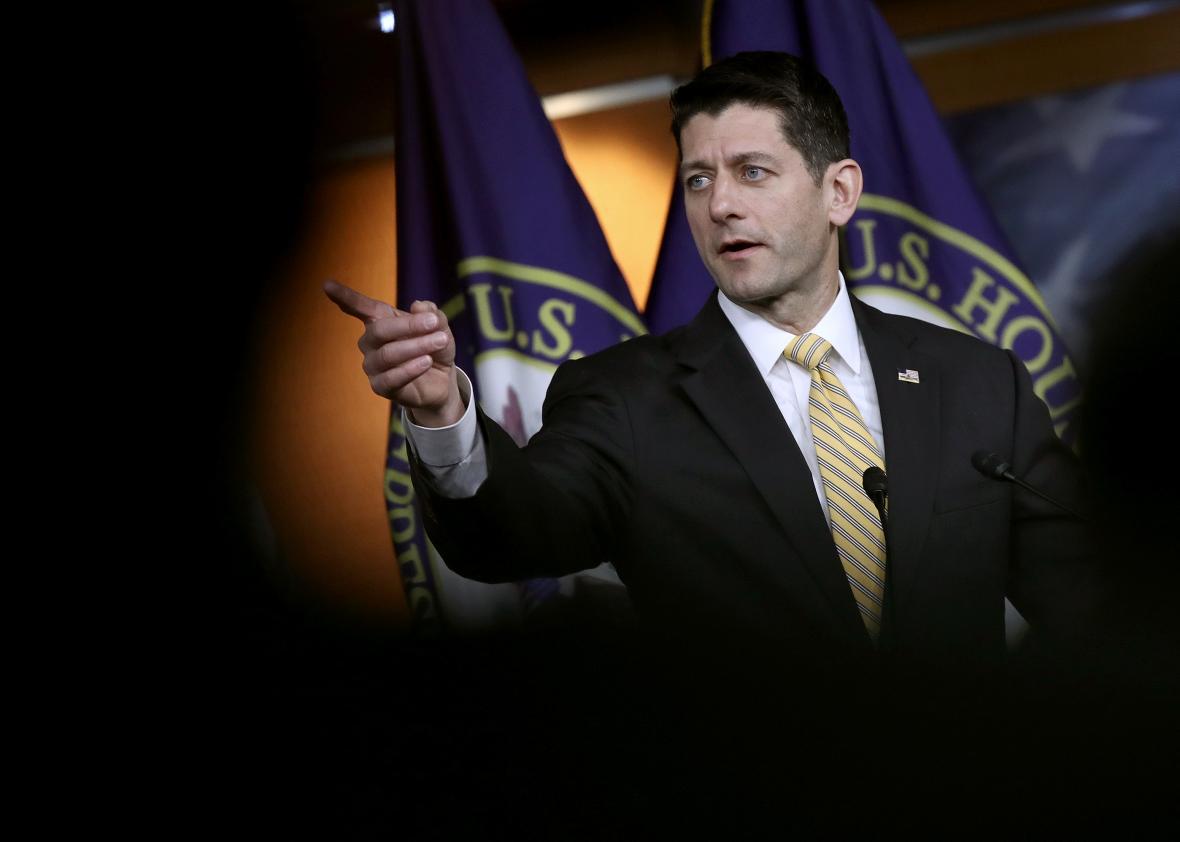Business may like House Speaker Paul Ryan’s health care overhaul proposal—the Chamber of Commerce enthusiastically endorsed it after House Republicans unveiled it on Monday. But not the health care business. The American Hospital Association was first out of the gate to announce its opposition to the widely criticized plan, followed quickly by the main physicians trade group, the American Medical Association.
Businesses believe the plan could help relieve them of costs. Health care businesses, however, believe it will relieve them of customers, and therefore revenues. Which shows that Ryan, the earnest faux-wonk who claims to have a great understanding of the private sector, has very little clue about what has happened in the health care economy over the past several years.
Simply put, the U.S. economy is more leveraged to health care than it ever has been. Health care accounts for greater absolute and relative levels of economic activity. That’s in part because the baby boomers are getting older and because there’s inflation in health care. But it’s also because the Affordable Care Act vastly increased the number of people who have health insurance coverage, boosting the number of people accessing in-patient services, prescription drugs, and medical devices. In 2015, health care spending stood up at $3.2 trillion, up 5.8 percent from the year before, according to the Centers for Medicare and Medicaid Services. Health care spending accounted for 17.8 percent of the U.S. economy, up from 15.5 percent in 2005. In January, health care accounted for 15.6 million jobs, up from 13.6 million in January 2010. Health care employs more people than the manufacturing industry that the Trump administration hopes to revivify, and almost as many as retail trade. In Birmingham, Alabama, as is typical in many cities, 4 of the top 10 employers are health care operations.
And this larger health care industry is, in turn, highly leveraged to the Affordable Care Act. With its incentives, mandates, carrots, sticks, and investment, the ACA reshaped the health care industry, channeled money in certain directions and provided signals for the industry to invest where demand would rise. Everyone had to redo their financial models—for good or ill—based on the impacts. Hospitals could, for example, presume lower levels of charitable care that had to be written off. Venture capitalists plowed $400 million into Josh Kushner’s insurance startup Oscar, which sells policies on the ACA exchanges. MedStar Health, to cite one example, “poured millions into creating an extensive ambulatory care network across the region—most recently opening a major one-stop health shop in downtown D.C.” Hospitals have borrowed billions of dollars in bonds and constructed new facilities designed to capture ACA-related business. With Medicaid expanding significantly in Kentucky, clinics expanded their capacity to treat people suffering from substance abuse; the number of Bluegrass State Medicaid recipients seeking such services has risen 740 percent.
Sure, everyone in the health care value chain—insurers, doctors, device-makers—complains about regulation and reimbursements. That’s just how they roll. They still know that the repeal of the ACA would leave them high and dry. And they know that a huge amount of investment and debt now rests on the edifice they’ve built in the past seven years.
In drumming up support for the ACA, the Obama administration and congressional Democrats essentially bought off different sectors of the health care industry—or, if you prefer, engaged in interest-group politics. They convinced businesses to sign onto legislation by providing them with incentives and asking them to make some sacrifices. Insurers were promised more customers buying their products with subsidized funds; hospitals were promised cash to fund innovation and fewer patients showing up uninsured in emergency rooms; doctors were offered the prospect of more patients needing more treatment and procedures through the expansion of Medicaid.
As Paul Ryan and company put together their new plan, they offered sweeteners to one sector of the health care industry and told the rest of the value chain to stuff it. The plan contains plenty of sops for the insurance industry—people will be penalized for not buying plans, tax credits will subsidize the purchase of policies, and they’ll be able to charge more and be required to provide less. Which explains why insurers have been essentially mute about the proposal.
But for the other sectors of the business—doctors and hospitals, pharmaceuticals and medical technology companies—the plan effectively offers nothing. In fact, it offers less than nothing. Curtailing Medicaid and causing millions of people to lose or forgo insurance is a recipe for reducing consumption of health care services. Far from improving their margins, as the plan might do for insurance companies, it will make it harder to run many health care businesses. Imagine trying to pay off the bonds that supported construction of a new hospital if hundreds of thousands of people in your service area lose insurance. Imagine trying to pay the salary of a primary care physician in Kentucky if Medicaid is diminished.
Businesses, we are told, crave certainty. The intent of the GOP’s plan, as currently constructed, is to inject a huge amount of uncertainty into the industry. It’s not surprising key sectors of it are getting very, very cranky.
